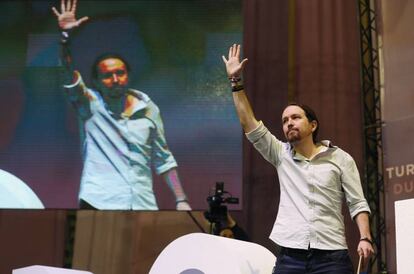Podemos chooses radical path as leader shores up control of party
Pablo Iglesias won 89% of votes at weekend leadership election after bitter power struggle

Pablo Iglesias, leader of Podemos, on Sunday reasserted his control over the Spanish protest party with an easy victory in a vote to choose the secretary general. With 89% of the vote, Iglesias comfortably defeated his rival for the post, Juan Moreno Yagüe, a little-known deputy from Andalusia.

Just as importantly, Iglesias will maintain a 60% hold on the leadership council with 37 representatives of his leftist views now sitting on it. The outcome deals a serious blow to his more moderate deputy Íñigo Errejón, who only managed to put 23 of his own people on the council.
The party congress held at Madrid’s Vistalegre arena this weekend also provided renewed backing for Iglesias’ views on political, organizational, ethical and gender issues.
We must rule out the winner-loser logic
Podemos official Miguel Urbán
What emerges from the vote of 155,275 activists is that Podemos’ rank-and-file favor an approach to politics that remains faithful to the protest party’s origins, back when the Indignados movement was staging street protests to demand change, at the height of Spain’s economic crisis.
Iglesias’ more radical views have trumped Errejón’s call for “a change of tack” and greater initiative in parliament, where Podemos has been left out of cross-party agreements on issues such as fuel poverty or raising the minimum wage, two topics that the anti-austerity party has championed in the past.
The new Podemos will remain a presidential-style party heavily reliant on its leader. Iglesias retains wide powers such as the ability to organize grassroots consultations without having to get them greenlighted by the leadership council first.
Rajoy wins at PP congress
The ruling conservative Popular Party (PP) held its own congress this past weekend, when Prime Minister Mariano Rajoy re-emerged as its unquestionable leader.
In fact, all relevant PP leaders said that Rajoy, 61, should be the conservative candidate in the next general election as well, whether it be in 2020 or sooner, if the budget is rejected and early elections are called.
Rajoy’s victory was hardly a surprise, given that he was the only candidate in the running. He won with 95% of the votes.
Under Iglesias, Podemos will resume its belligerent opposition to the “Great Coalition” made up of the ruling Popular Party (PP), the main opposition Socialist Party (PSOE) and the other protest party to emerge from the crisis, Ciudadanos.
While Errejón advocates a more conciliatory tone in order to effect change through legislative action, Iglesias does not want congressional deputies so much as “institutional activists.”
“We must never resemble the old political class,” he proclaimed on Sunday, speaking to a crowd of around 8,000. Podemos, he said, must be a party “that tells the truth.”
But Iglesias faces the challenge of bringing unity back to a party that has been exhausted by months of infighting.
Miguel Urbán, a leading party member who represents far-left views, on Sunday attempted to bridge the internal divide with a renewed call for unity.
“Unity is not uniformity, it is built through plurality,” he said. “We must rule out the winner-loser logic.”
English version by Susana Urra.
Tu suscripción se está usando en otro dispositivo
¿Quieres añadir otro usuario a tu suscripción?
Si continúas leyendo en este dispositivo, no se podrá leer en el otro.
FlechaTu suscripción se está usando en otro dispositivo y solo puedes acceder a EL PAÍS desde un dispositivo a la vez.
Si quieres compartir tu cuenta, cambia tu suscripción a la modalidad Premium, así podrás añadir otro usuario. Cada uno accederá con su propia cuenta de email, lo que os permitirá personalizar vuestra experiencia en EL PAÍS.
¿Tienes una suscripción de empresa? Accede aquí para contratar más cuentas.
En el caso de no saber quién está usando tu cuenta, te recomendamos cambiar tu contraseña aquí.
Si decides continuar compartiendo tu cuenta, este mensaje se mostrará en tu dispositivo y en el de la otra persona que está usando tu cuenta de forma indefinida, afectando a tu experiencia de lectura. Puedes consultar aquí los términos y condiciones de la suscripción digital.








































